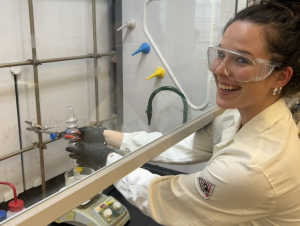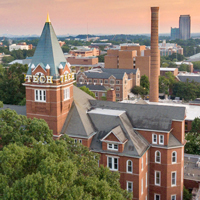Latest News
Researchers have discovered evidence that a mountain on the rim of Jezero Crater — where NASA’s Perseverance Rover is currently collecting samples for possible return to Earth — is likely a volcano. The research could add critical clues to the habitability and volcanism of Mars, transforming how we understand Mars’ geologic history.
Eric Shen loves art and science in equal measure — and believes it’s possible for creatives to build STEM careers that foster joy. Learn about his unexpected path to becoming a research engineer in the School of Chemistry and Biochemistry.
The concept, cool yet maybe a little creepy, is known as mind uploading.
For her first undergraduate research experience, Marielle Frooman did more than work in the McShan lab — she helped lead research that could shape the future of malaria treatment.
The world’s largest robotics conference is coming to Atlanta, and 136 researchers and students from Georgia Tech will showcase their novel and groundbreaking contributions to a booming field.










